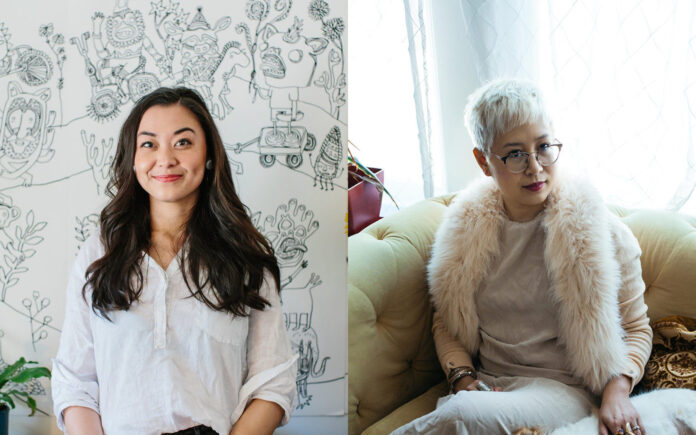Artist and writer Chanel Miller‘s 75-foot mural at the Asian Art Museum, I was, I am, I will be, is on view in the museum’s new Wilbur Gallery and can be seen from the street. Recently, artist Judy Chicago whose first ever retrospective is at the de Young Museum, saw the mural in person and described it as, “Really fantastic and powerful.” The mural represents stages of healing, and encourages people to think of life as “an endless state of becoming.”
On September 23, as part of the museum’s Thursday Nights at the Asian Art Museum, Miller, the author of Know My Name, in which she revealed she was Emily Doe whose victim impact statement in her 2017 Stanford assault trial went viral, will talk with fellow best-selling New York Times author, Esmé Weijun Wang. Wang wrote the essay collection The Collected Schizophrenias and the novel, The Border of Paradise.
In an in-person conversation moderated by Abby Chen, the head of contemporary art at the museum, Miller and Wang will talk about healing, writing, art, and activism. Wang, who also founded The Unexpected Shape Community for “ambitious writers living with illness and disability,” wrote in an email, “I plan to approach it like a conversation among peers about joy and pain. The two things live as neighbors, and Chanel’s work is so much about that. We’re both visual artists as well as writers. I want to pursue that avenue of exploration.”
Wang and Miller first met when Miller came to a book event in San Francisco for The Collected Schizophrenias. Wang says that like many, she had read and been moved by Miller’s victim impact statement although they met before Miller revealed she was Emily Doe. Wang bought Know My Name when it came out and both read it and listened to the audiobook. She then followed Miller on social media where she saw a lot of Miller’s art. She says she found the art, as well as Miller’s book, striking.
“Her book is so much about trauma, but also the aftermath of trauma,” wrote Wang. “And the art is primarily about healing, and the changes we go through to heal. I live with C-PTSD, so that speaks to me quite a bit.”
Miller has said that writing about her assault and reading the transcripts of the trial for the man who assaulted her was painful but going through the process allowed her to return to the present. Wang also believes writing helps with healing.
“Writing helps me to process trauma, which is such an amorphous and strange animal,” she wrote. “Putting it into words pins it down and makes it less terrifying—in words, it becomes concrete.”
MEET THE ARTIST: CHANEL MILLER IN CONVERSATION WITH ESMÉ WEIJUN WANG Thu/23, 6:30pm at Asian Art Museum, SF. This event is free with a general admission ticket. Tickets are $10 after 5pm. Tickets and more information here.






